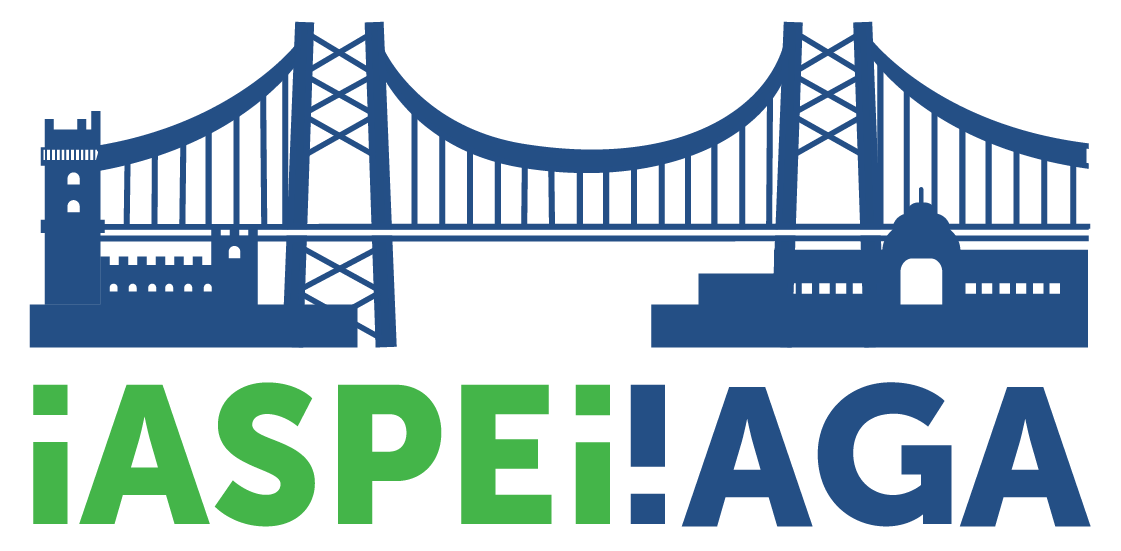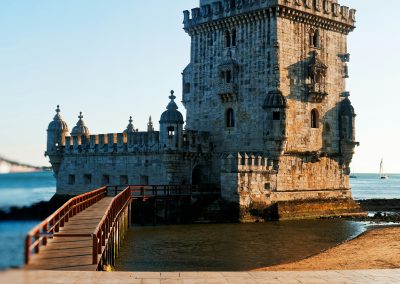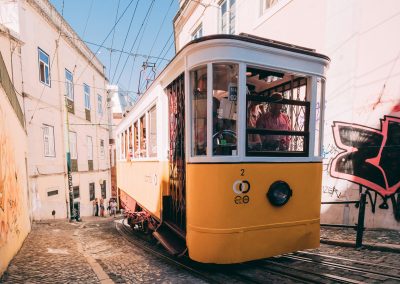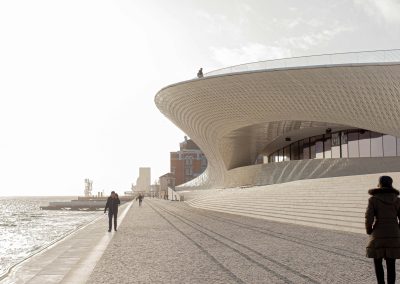LISBON ATTRACTIONS
Lisbon, Portugal
Portugal is a country in southwestern Europe, bordered to the west and south by the Atlantic Ocean and to the east and north by Spain. Its total area is 92,090 square kilometres, and its population density is estimated to be 112 people per square kilometre.
Portugal, known for its rich maritime history, is not landlocked and boasts a long Atlantic coastline with diverse landscapes, including rolling plains, mountainous regions, and extensive beaches. Situated on the Iberian Peninsula, Portugal lies approximately 2,700 miles southwest of the British Isles and 5,200 miles west of the eastern coast of the United States. The altitude ranges from sea level to 1,993 meters at Mount Pico, the highest peak in the Azores.
Portugal experiences a Mediterranean climate with two main seasons: a hot, dry summer from June to September and a mild, rainy winter from November to March, with an average rainfall of 50-150 mm per month. The average temperature ranges from 10 to 28ºC, with the hottest months being July and August.
About Lisbon
Lisbon, Portugal’s capital city, is located at the country’s western coast along the Atlantic Ocean. Covering an area of approximately 100 square kilometres, the town is situated at latitude 38°42’ N and longitude 9°08’ W. Lisbon enjoys a Mediterranean climate, with an average annual high temperature of 21°C and an average annual low temperature of 13°C. The city receives an average annual precipitation rate of about 774 millimetres.
Lisbon is one of the most visited cities in Portugal, attracting tourists with its historical sites, cultural attractions, and bustling nightlife. The city is also home to the Lisbon Portela Airport, located just 7 kilometres from the city centre. Getting around Lisbon is convenient, with various public transportation options, including trams, buses, and the metro. Taxis are also widely available and can be easily recognised by their black and green colour.
People & Culture
Portugal has an estimated population of around 10.3 million people, with Lisbon being the most populous city. The median age in Portugal is approximately 46 years old, reflecting an older demographic compared to other countries. Portuguese is the official language, and English and French are also commonly spoken, especially in tourist areas.
The Portuguese culture is deeply influenced by the country’s history, music, and traditions. Fado music, known for its expressive and melancholic character, is integral to Portuguese cultural heritage. Portuguese cuisine, famous for its seafood and pastries like pastéis de nata, is celebrated worldwide.
Lisbon’s blend of traditional and modern influences offers a vibrant cultural scene with numerous festivals, museums, and theatres. The city’s architecture combines Gothic, Manueline, Baroque, and contemporary styles, reflecting its rich historical and cultural evolution.
Public Transport
Metro
Every day from 06:30 am to 01:00 am.
Click for more info
Trains
Every day from 05:00 am to 01:00 am.
Click for more info
Buses
Every day from 05:30 am to 12:30 am. Night service from 12:30 am to 05:30 am.
Click for more info
General information on Public Transport can be found at Visit Lisbon.
Language
Portugal’s official language is Portuguese. Derived from Latin roots, Portuguese is the world’s third most-spoken European language, with around 250 million speakers.
Electric Voltage
230 / 400 volts, on a 50-hertz frequency. The electric sockets adhere to European standards. Blade plugs (US standard) must be used in conjunction with a 230-volt transformer and an adaptor.
Local Currency
The euro is Portugal’s official currency
Passports and Visas
In addition to their identity document, Minors must present parental authorisation to travel.
For countries exempt from visa requirements to enter the Schengen Area, a passport valid for more than three months after the end of the stay is required for stays that do not exceed 90 days.
In accordance with the Convention implementing the Schengen Agreement, passengers travelling to or from another Schengen State do not need a new visa as this is considered to be an internal flight.
Citizens from other States need a visa to enter Portugal, which may be requested from the Portuguese Consulate or Embassy in the respective country for stays of up to 90 days.
Further information at:
Visas – vistos.mne.gov.pt
Consular Network – portaldascomunidades.mne.gov.pt
Agência para a Integração, MIgrações e Asilo – aima.gov.pt
Visa application must be done up to middle of April 2025 with abstract confirmation in Early Bird.
Getting to Lisbon
There are many easy ways to get to Lisbon. The airport is just a few minutes from the centre of the city, and stations with international rail links and various ports for cruise ships are nearby. If you prefer to come by car, there are excellent roads from various points north and south along the border with Spain.
Air
Land at the Lisbon International Airport, just 7 km from the city centre. It is very easy to reach, served by the leading international airlines, and just 3 hours away from the main European capitals.
Train
It is just as easy to reach the centre of the city. National and international trains arrive daily at Santa Apolónia station, close to all the traditional neighbourhoods and Terreiro do Paço. But if you would like to add a unique architectural experience to your arrival, get off at Gare do Oriente, whose Calatrava-designed lines impress even those who see it daily.
Sea
Those arriving by sea have one of the best views of Lisbon – from the river – and can moor in 3 different places, all near the centre. If you come by cruise ship, you can dock at Alcântara, Rocha Conde de Óbidos or Santa Apolónia. If you arrive by yacht, there are several marinas as you sail up the river.
Car
The best ways to enter Lisbon are via the A1 and A2, which both have national and international connections along their course. The landscape is beautiful, and mobility around the region compensates for the long hours of driving. After all, there is more to Lisbon than just the city.




